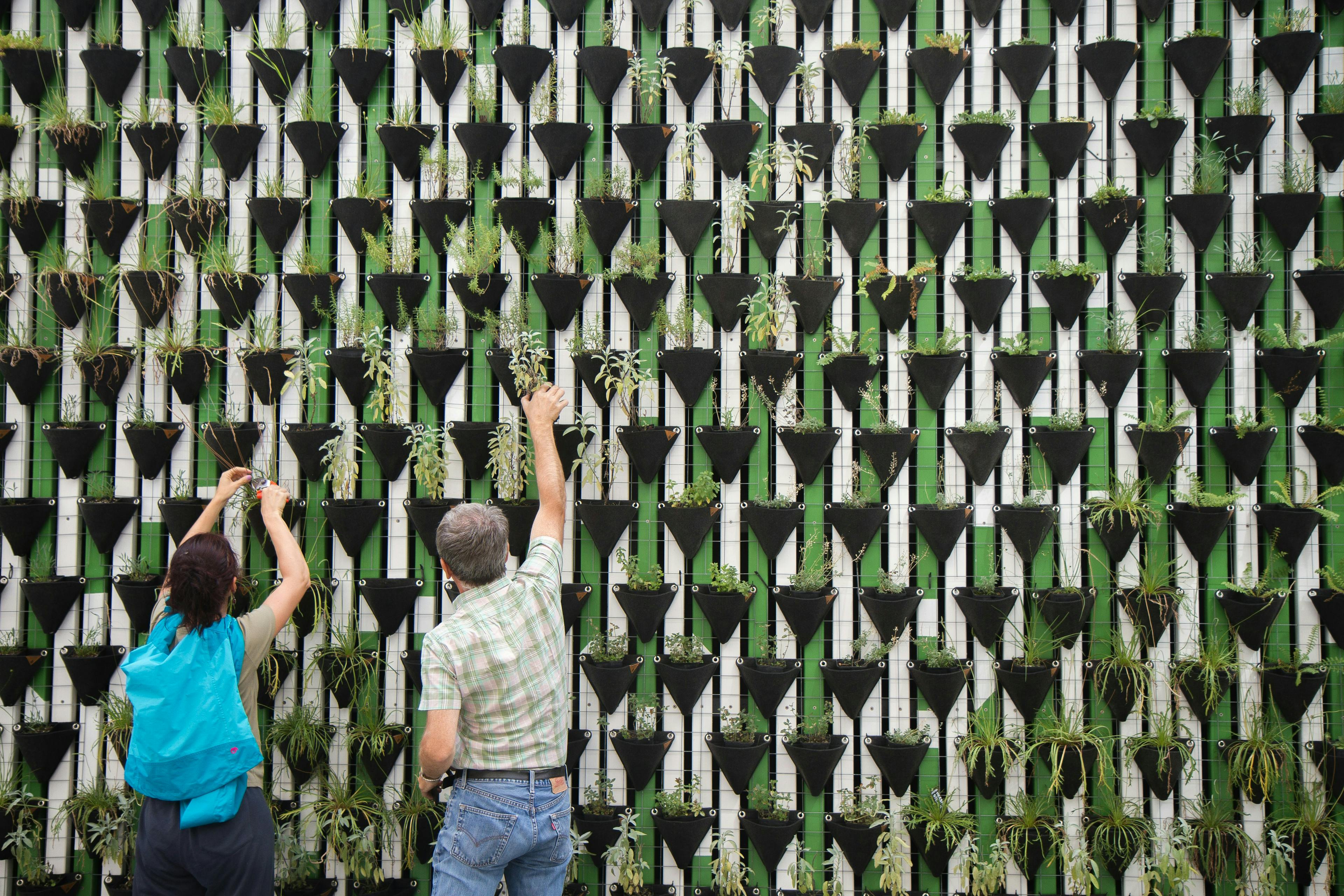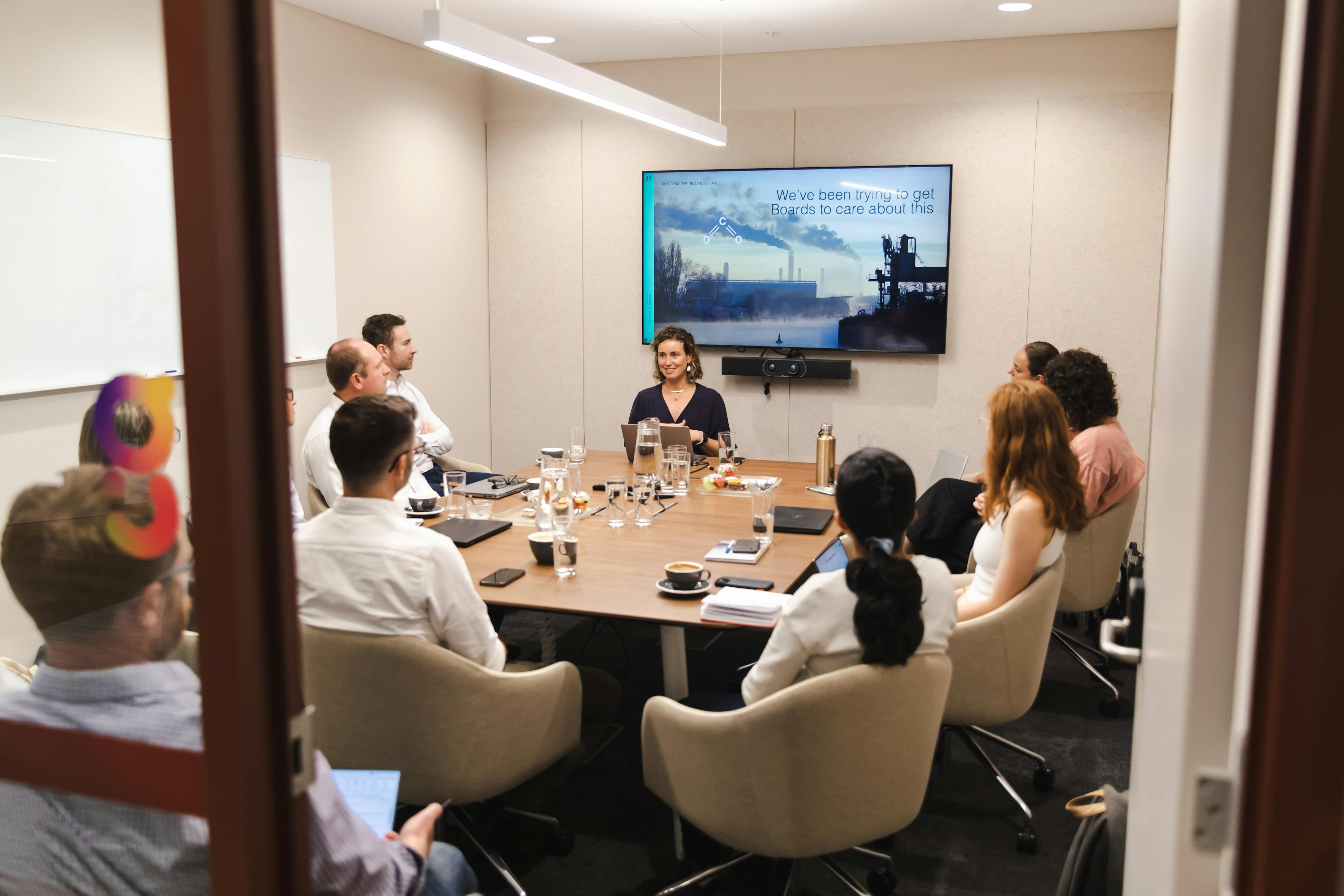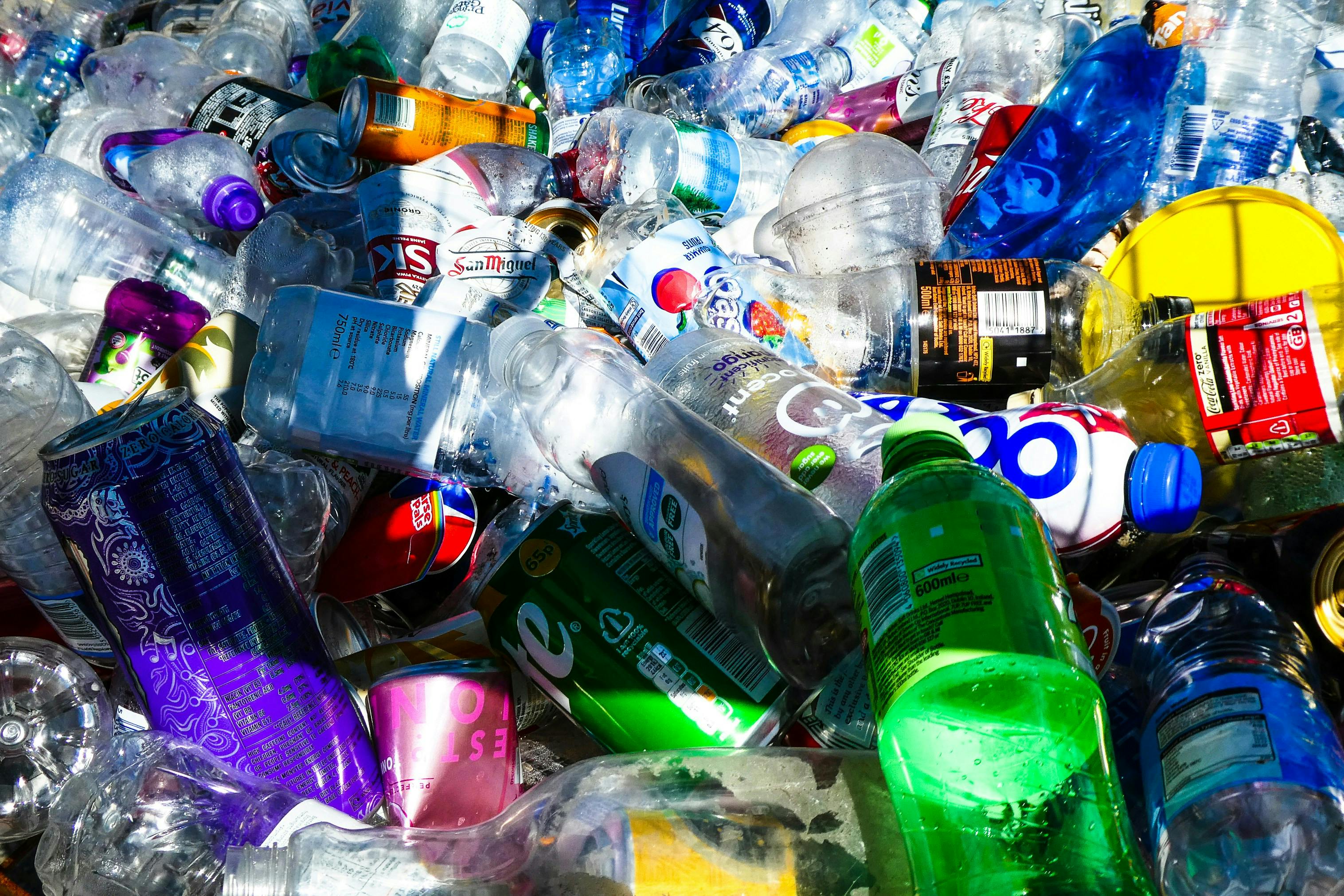
Tiny Acts, Big Impact
Written by: Various Edge Impact contributors
Not everything needs a bold headline or a sweeping pledge.
Sometimes, the most meaningful climate action happens in the in-between, what we choose at the supermarket, how we move through our cities, or what we do with leftovers at the back of the fridge.
This series is about the small things our team does, often without thinking, that reflect a deeper awareness of the world around us. They’re not always perfect, but they’re intentional. Rooted in what we’ve learned through our work, conversations, and day-to-day lives.
They’re tiny acts. But they add up.
This is what a circular community can look like
How volunteering with a local food relief organisation has connected us to purpose, people, and impact.
Rachael (Marketing Manager) and Lilia (Analyst, Lifecycle Thinking) have been volunteering as part of the composting and recycling team at One Meal Northern Beaches, a local not-for-profit.
They share some of the lessons they’ve learned about what it takes to build a circular community, and how individuals, schools, and organisations can come together to make a real impact.
Volunteering has made me rethink what impact looks like. Sometimes it’s not big or loud.
Instead, it’s sorting through old fruit and veggies so it goes to compost, not landfill. Since 2023, One Meal’s composting program has redirected an estimated 4.5 tonnes of food waste from landfills.
Small, consistent actions that quietly add up to something much bigger.
Rachael De Costa,
Marketing Manager

Composting, community and closing the loop with One Meal
Written by: Rachael De Costa, Marketing Manager
Entirely volunteer-run, One Meal is a humble and hard-working logistical machine that serves and delivers thousands of hot meals and hundreds of fresh fruit and vegetable hampers each week, alongside many other social services.
What I value about our particular role at One Meal is how composting brings the organisation's mission full circle. It links generosity (in the form of donated food) with careful sorting, sharing, and renewal.
Nothing is wasted. What can nourish people is delivered to them and what can’t be eaten is composted or recycled wherever possible.
It’s a small, thoughtful system that reflects a much bigger commitment to community and sustainability.
The composting program first began with just a few compost bins at Fisher Road School, a school that supports students with intellectual disabilities. The students quickly embraced the opportunity, turning composting into a hands-on learning activity.
Thanks to the efforts of the One Meal composting crew, along with supportive partners such as Kimbriki and Up&Over, there are now more than 15 compost bins at the school, managed almost entirely by the students.
The compost is bagged and sold to locals, with all proceeds going back into the program. It’s helping to divert even more food waste from landfill while creating nutrient-rich soil for local gardens.
This initiative is continuing to grow, with Cromer Public School recently setting up its own set of compost bins. Sparked by one passionate staff member who decided to make it happen, proving that sometimes that’s simply all it takes. One person with an idea and the energy to lead.
The support is out there, and when people come together around a shared goal, like the song goes, "from little things, big things grow."
Volunteering with One Meal has been such a grounding experience. It’s made me reflect on the privilege of having the time, energy and stability to give back, and how easy it is to go about daily life without seeing the challenges faced by others in our neighborhoods.
It’s not always just about the systems and strategies. It’s people working side by side, transforming waste into something useful, closing the loop in a way that is tangible, meaningful and driven by community support.
I’ll end with a note that was left for one of our volunteers, a quiet reminder of the impact these small acts can have:
“To One Meal, I would like to cancel all meals as now I am back on my feet.
I would like my supplies to go to someone in need.
I would also like to say a big thank you to everyone.
The volunteers and One Meal do save us.”

To me, organisations like One Meal are a shining example of sustainability.
It’s shown me how much can be achieved through community commitment and participation, how we can maximise our resources, minimise waste, and create a meaningful impact not only for ourselves, but also for others.
Lilia Caballero,
Analyst, Lifecycle Thinking

One year ago, through my sister—who was also volunteering at One Meal—I had the pleasure of meeting Kim Williams, Northern Beaches Coordinator and One Meal Board Member.
Kim is a person with a huge heart and a remarkable sense of altruism. He has inspired an entire community to support those in need.
As he says, "Within any community, there will always be people who need more support from others. It is the responsibility of the community to provide that support."
This sentiment has resonated with me deeply and is a big reason why I volunteer.
Our Thursday morning at One Meal starts at 7:20 am as we head to the Brookvale warehouse. It’s always the same when we arrive: a flurry of activity, smiling faces, and a real sense that people want to be there.
We begin with the basics: breaking down boxes, sorting fruit and veg, and sorting excess packaging. It might seem simple, but every step is about making sure nothing goes to waste. Whether that means composting food scraps or recycling properly.
By 8:05 am, the compost is weighed and ready to go and around this time the next stream of volunteers arrives to collect and deliver meals to families and individuals who need food support.
It's truly impressive to witness the level of logistics and coordination powered by a community united by a common purpose.
At 8:15 am, we then head off to the local partner school where students take part in an integrated composting program. Through their involvement in the various stages of composting, they develop valuable skills such as environmental awareness, responsibility, and a sense of civic duty.
To me, One Meal is a shining example of sustainability.
It’s shown me how much can be achieved through community commitment and participation, how we can maximise our resources, minimise waste, and create a meaningful impact not only for others, but also for ourselves.
Restoring the Forests Beneath the Waves: The Crisis of NSW Kelp Ecosystems
Written by: Katie Denoon, Senior Consultant, Sustainable Cities
As a full-time working sole parent, I often find myself on the receiving end of well-meaning offers from friends and neighbours, “Let me know if there’s ever anything I can do to help.” At first, this sounds supportive. Yet, at times when I need it most, it can feel more like a throwaway line without clear boundaries, scope, or timeframe.
The truth is, I don't find it easy to hand off tasks like household responsibilities, getting to weekly events, or home repairs. These seemingly simple chores are the very things that trip me up in the balancing act of career and motherhood, especially during times when my attention is in high demand. And when I struggle to define specific ways others can help, I miss opportunities of support.
In many ways, this same dilemma mirrors the challenges we face when it comes to protecting our environment.
The health of both our sea and urban forests depends on all of us taking active steps to restore what has been lost, both on land and under the sea.
As for land and sea temperature, well, we all have a part to play in turning down the heat of our planet.
Katie Denoon,
Senior Consultant, Sustainable Cities

Communities are full of well-meaning people eager to make a difference, but when it comes to specific, actionable steps to protect biodiversity our collective efforts can feel, at times, unclear.
At a recent AdaptNSW forum, I was struck by the presentation by Marine Ecologist, Georgina Wood, on the extreme decline of sea kelp forests, an ecosystem right at my toe-tips every time I swim in the sea though which I have completely overlooked.
Kelp forests are vital to our coastal ecosystems, supporting marine life and providing shoreline protection. Yet, like the urban forests we work to protect on land, NSW kelp forests are under threat from climate change.
Georgina Wood’s incredibly informative presentation highlighted that coral reef and kelp forest ecosystems, which make up more than 50% of the world’s coastal ecosystems, are now at a very high risk of widespread, climate-driven collapse. This is not a distant threat; it's expected to happen within the next decade.
I also learned that the regeneration and restoration of kelp forests is complicated by the short lifespan of many kelp species, which is around just five years.
The urgency of protecting these underwater forests, and identifying species that can tolerate increasing water temperatures became uncomfortably clear, and it raised the question: if we can’t clearly articulate how to support forests above and below the water, how can we expect people to take meaningful action?

Six-spine leatherjacket hiding in the understorey of a kelp forest. (Photo: John Turnbull)
The same principles that apply to urban forest renewal; strategic planning, community engagement and clear paths for action seem to be essential for the restoration of marine ecosystems like kelp forests too.
When I advocate for tree planting, I’ve often noticed that even though the need for urban canopy renewal is clear, the road to success requires more than simply planting trees; it demands appropriate planning and resources, suitable species selection, and long-term maintenance.
I learned in Georgina's presentation, it’s the same with marine ecosystems: the road to kelp restoration requires collaboration, commitment, and specific actions, like supporting the Reef Adapt tool and community-led restoration efforts such as Operation Crayweed.
Trees have been the glow in the epicentre of my career for the last 2 decades, particularly in the realm of urban greening and community engagement.
For urban forest renewal, the formula is clear: plan, plant, and maintain.
It’s about allocating resources, securing quality stock, and fostering community buy-in. Similarly, marine restoration needs a dedicated effort.
Communities must be educated about the importance of kelp, and local stakeholders must be involved in hands-on restoration activities.
We can’t expect one person, one group, or even one government to tackle these challenges alone. It requires collaboration at every level, from grassroots adoption and initiatives to policy-level changes.
Urban forests thrive when communities recognise their value and actively support their retention and care. Kelp forests, too, can thrive if we approach their protection with the same level of dedication and strategy.
For both types of ecosystems, the path forward requires turning down the heat, clear communication, tailoring engagement strategies, and actionable steps for people to get involved.
We must create opportunities for meaningful action and ensure these efforts are integrated into local and national policies.
As we face the combined crises of climate change, habitat destruction, and biodiversity loss, it’s clear that isolated efforts won’t be enough. We need a broad, interconnected view of ecosystem health, one that includes both terrestrial and marine environments.
Just as we plant trees to renew urban canopies, we need to take meaningful steps to restore and protect our kelp forests. By linking community efforts in both realms, we can protect and restore the biodiversity that sustains our communities.
Here are 3 ways you can help sea kelp forests:
- Get involved in local restoration projects, such as Operation Crayweed in Sydney or support organisations like Green Gravel that are working on seeding rocks for marine restoration;
- Contribute to the development of Reef Adapt, which is advancing climate resilience for kelp forests through mapping and research; and
- Learn about the role kelp forests play in our ecosystems through resources like Great Southern Reef and help spread the word.
Here are 3 ways you can help urban forests:
- Plant native trees and shrubs on your property, selecting species that are well-suited to your local environment and the space available for them to grow up, out, and down. Ensure they are pruned to develop into mature trees with strong branch architecture;
- Advocate for tree planting in your local area by requesting that your Council plant a tree in your nature strip. Commit to watering it during its establishment period. Even better, engage with your neighbours to discuss and support a community-wide street tree project; and
- Volunteer with local bushcare or conservation groups to restore native vegetation in your local area.
So, what steps will I take?
I have donated a tree family to Operation Crayweed and, after the Christmas holidays, will reach out to see how I can actively assist in replenishing Crayweed in my local area. I plan to contact nurseries to inquire if their glasshouses can support gravel seeding.
Most importantly, I’ll make sure to keep Reef Adapt funding opportunities top of mind in networking conversations. These are tangible actions, as a mere-mortal Mum, I can do.
The health of both our sea and urban forests depends on all of us taking active steps to restore what has been lost, both on land and under the sea. As for land and sea temps, well, we all have a part to play in turning down the heat of our planet.
Food waste - a global issue
Written by: Nick Jackson, Analyst, Circular Economy and Lifecycle Thinking
Through my experiences living with family and friends, I’ve learnt a lot about behavioural change and its connection to systemic changes we, as sustainability professionals, aim to address.
At home, I have helped organise our compost system and subsequently, repurposing the soil into our home garden. Composting is a vital practice individuals can adopt to significantly reduce the amount of food waste ending up in landfill.
Change is incremental; it is a process, and it requires human accountability, relationships, and trust to bridge the gaps in how we account for waste in our homes.
Nick Jackson,
Analyst, Circular Economy and Lifecycle Thinking

Home composting involves transferring leftover fruits and vegetables (for home gardens) into a controlled aerobic environment – for most homes this looks like a tumbler compost or a stand-alone compost.
By composting at home, we allow food to naturally decompose and be converted into nutrient-rich soil that can enhance the health of our gardens or local vegetable plots. Conversely, when food waste decomposes in landfills it releases methane, a potent greenhouse gas.
The applications of a home compost system not only reduce emissions but also fosters a personal sense of circularity in the food system whilst witnessing the power of food waste to regenerate soil. For me, this process makes perfect sense and is fun. Any food waste – transfer it to your compost, then after a period of time, to gardens, plant pots, or veggie plots. Pretty simple.
Well in my experience, communicating the importance and demonstrating the impact has been difficult to close friends and family. In fact, at my own home I've tried various methods to support them.
Have they all worked? No. But changing behaviours isn’t easy.
Ask my family about the numerous rhetorical question signage I leave on their bins or daily reminders in the group chat. Changing and adapting entrenched behaviours is not simple – and gifs, whilst engaging, still require continuous reinforcement.
Globally though we require shifts in behaviour when thinking about circularity and its outcomes in waste management and operations. A circular economy involves increasing the capacity for recycling all forms of materials to ensure they can continually have purpose in multiple lifecycles – this is important in industry but also at your home – a microcosm for how society should operate and manage waste.
Food waste recycling is still abstract, it will require time, and it does require for you to rethink how you separate your food waste at home and how you can influence your own home or neighbourhood. Unfortunately, there’s not always a cash incentive but fighting the small battles against climate change is an easy way for you to contribute and influence your close circle.
In the same way I communicate, reinforce and engage my friends and family with one topic, you can do the same with your friends/peers.
Here are some stats about food waste in homes that are extremely alarming; especially with food insecurity and increasing populations:
- 8 - 10% of greenhouse emissions are linked to unconsumed food.
- Australia discards approximately 7.6 million tonnes of food a year; 2.5 million tonnes comes from our homes.
- Throwing one burger away is the equivalent of a 90-minute shower.
- 25 million hectares of land is wasted to grow food that is not eaten.
Source: Ozharvest
Addressing climate change is not just about renewable energy – it is also about reducing our waste and increasing the lifecycle of our products and food.
Yet, nature has a funny way of laying out solutions for us.
Composting is one such solution that is in urgent need of capacity uplift across Australia. The more we compost or correctly recycle our food in organic bins, the more impact we can have in reducing global greenhouse emissions, regenerating our soils, and inviting the change we want to see in the world.
We’re fighting a systemic issue with food waste that needs to be battled not only with government legislation and through industry; but at a micro level in the home.
Here are some actions/thoughts I try at home;
- Educating individuals in your immediate home or close social circle when they’re not separating their rubbish appropriately;
- Developing signage on your home bins to direct individuals to the correct bin based on your waste stream;
- Stay accountable! Ensure you know what can or cannot be recycled and direct this information to your immediate home.
Unfortunately, with behavioural change, patience and constant communication is required.
Change is incremental; it is a process, and it requires human accountability, relationships, and trust to bridge the gaps in how we account for waste in our homes.
Be the voice for your home.
Learn more about our Circular Economy and Lifecycle Thinking services today or explore all services.
Our sustainability consultants have deep technical knowledge and years of real-life experience. We’ll help you determine the impact you make and track it through the process. Get in touch today.
What we do
As experts in the full spectrum of sustainability topics, we are here to guide you through the complexity. Our team includes specialists from across the globe; from strategists to economists, engineers to creatives. Since 2008, we have been helping businesses, organisations, industries and societies make transformation happen.
Our areas of expertise are focussed around the following areas:
Leadership and Transformation
ESG and Strategy
Decarbonisation and Climate Resilience
Circular Economy and Lifecycle Thinking
Procurement and Supply Chain
Nature and Biodiversity
Brand, Communications and Creative







